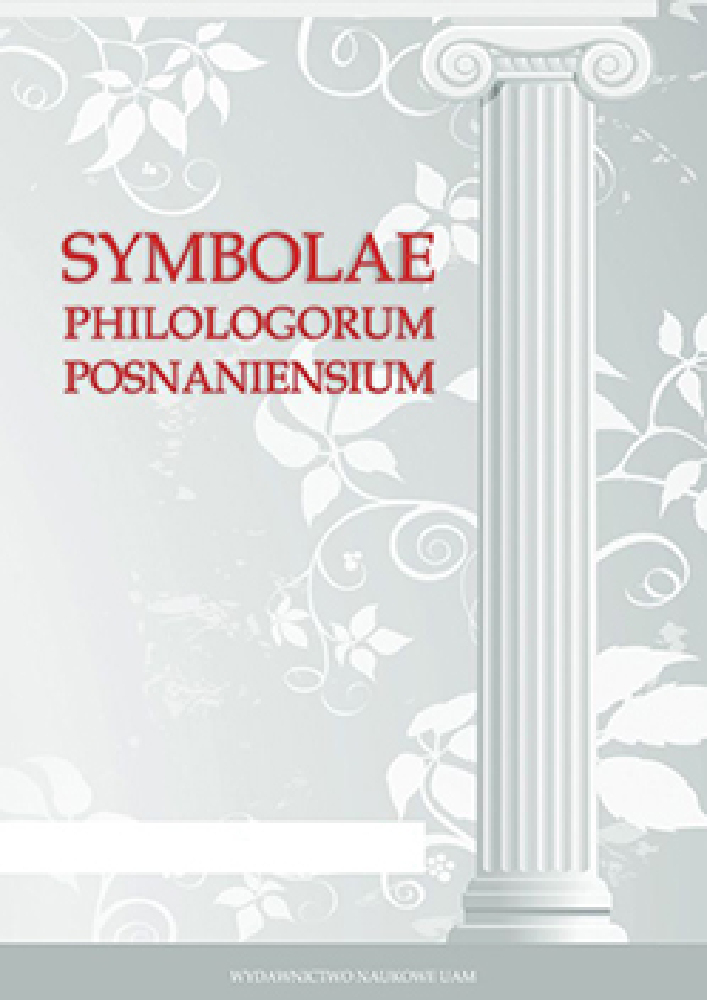Abstrakt
Athenian funeral oration (epitaphios logos) belongs to the epideictic rhetoric. But according to Aristotle the topics used in epideictic oratory could be applied in the deliberative kind, after some modification in the matters of language. In this article I consider the means proposed in the narrative part of the composition, which can be used instead of argumentation in epideictic oratory, i.e. amplification, metaphors and actualization (putting things before the eyes, gr. energeia, lat. evidentia). My purpose is to answer the question who was/is the recipient of Athenian funeral oration. In my opinion there are three kinds of primary recipients: the dead soldiers in the battle, the listeners present at the celebration (Athenians and foreigners) and the Idea of Democracy itself. I also try to find the so-called secondary recipient of Athenian funeral oration. I treat Athenian funeral oration as a hybrid genre of Greek rhetoric.
Bibliografia
Źródła, przekłady, komentarze
Aristotle, The „Art” of Rhetoric, vol. XXII, with an English transl. by J.H. Freese, Cambridge 1985.
Arystoteles, Retoryka. Poetyka, przekł., wstęp i koment. H. Podbielski, Warszawa 1988.
Arystoteles, Retoryka dla Aleksandra, w: Arystoteles, Dzieła wszystkie, t. VI, przekł. i wstęp H. Podbielski, Warszawa 2001.
Cicero, De oratore, oprac. K. Kumaniecki, Lipsk 1969.
Cicero, Pisma krasomówcze i polityczne Marka Tuliusza Cycerona, przeł. E. Rykaczewski, Poznań 1873.
Demostenes, Wybór mów, przeł. i oprac. R. Turasiewicz, Wrocław 1991.
Homer, Odyseja, przeł. J. Parandowski, Warszawa 1967.
Hypereides, Mowy, przekł., wstęp i koment. J. Kucharski, Katowice 2016.
Isocrates, vol. III, Loeb Classical Library with an English transl. by L. van Hook, Cambridge 1968.
Ksenofont, Wspomnienia o Sokratesie, w: Pisma sokratyczne, przekł. i wstęp L. Joachimowicz, Warszawa 1976.
Lizjasz, Mowy, przekł., oprac. i wstęp R. Turasiewicz, Kraków 1998.
Menander Rhetor, Peri epideiktikon, ed. with transl. and comm. D.A. Russell, N.G. Wilson, Oxford 1981.
Platon, Fajdros, przekł., wstęp i koment. L. Regner, Warszawa 1993.
Platon, Meneksenos, przekł., wstęp i koment. K. Tuszyńska-Maciejewska, Wrocław 1994.
Tukidydes, Wojna peloponeska, przekł., przedmowa i przyp. K. Kumaniecki, Warszawa 1953.
Opracowania
Beale 2002: W. Beale, Rhetorical Performative Discourse, w: Greek Literature, vol. V: Greek Literature in Classical Period: the Prose of Historiography and Oratory, ed. by G. Nagy, New York–London 2002.
van Dijk 2001: T.A. van Dijk, Dyskurs jako struktura i proces, przeł. G. Grochowski, Warszawa 2001.
Foster 2010: E. Foster, Thucydides, Pericles, and Periclean Imperialism, Cambridge 2010.
Jaczynowska, Mączkowa, Tyloch 1969: M. Jaczynowska, M. Mączakowa, W. Tyloch, Historia starożytna, Warszawa 1969.
Hansen 1999: M.H. Hansen, Demokracja ateńska w czasach Demostenesa. Struktura, zasady, ideologia, tłum. i indeksy R. Kulesza, Warszawa 1999.
Lausberg 2002: H. Lausberg, Retoryka literacka, oprac. i wstęp A. Gorzkowski, Bydgoszcz 2002.
Loraux 2006: N. Loraux, The Innovation of Athens. The Funeral Oration in Classical City, transl. A. Sheridan, New York 2006.
Reale 1996: G. Reale, Historia filozofii starożytnej, t. II, przeł. E.I. Zieliński, Lublin 1996.
Russell 1981: D.A. Russell, Introduction, w: Menander Rhetor, eds. with translation and commentary D.A. Russell, N.G. Wilson, Oxford 1981.
Too 1995: Too Yun Lee, Rhetoric of Identity in Isocrates, Cambridge 1995.
Turasiewicz 1999: R. Turasiewicz, Życie i twórczość Lizjasza, Kraków 1999.
Ziomek 1990: J. Ziomek, Retoryka opisowa, Wrocław 1990.
Licencja

